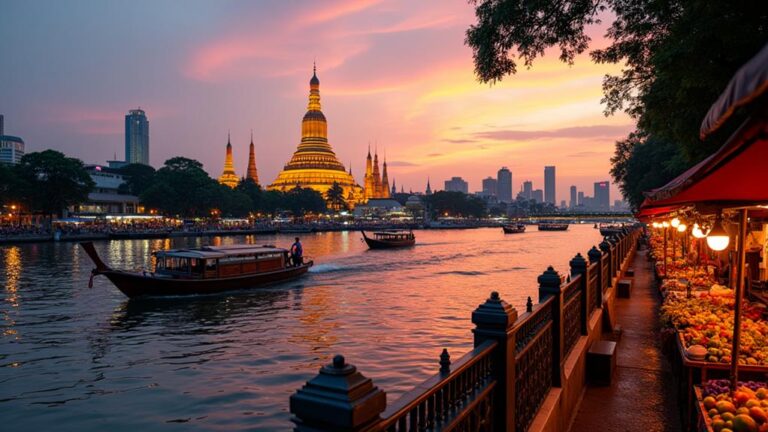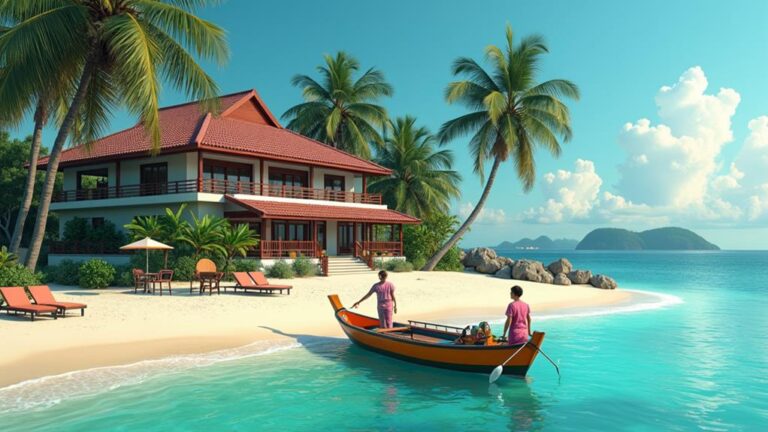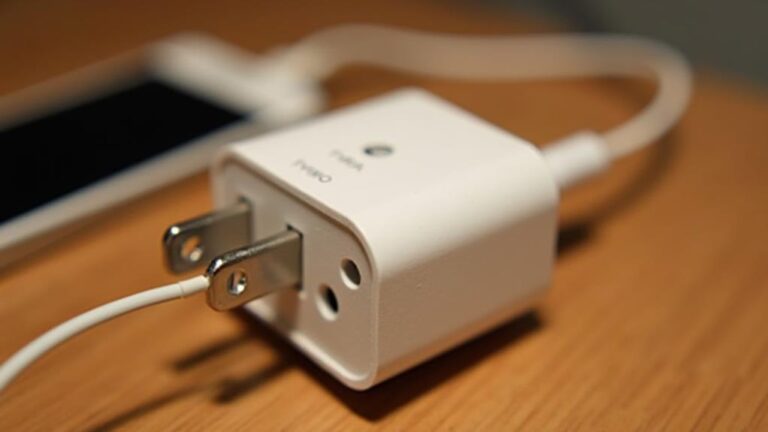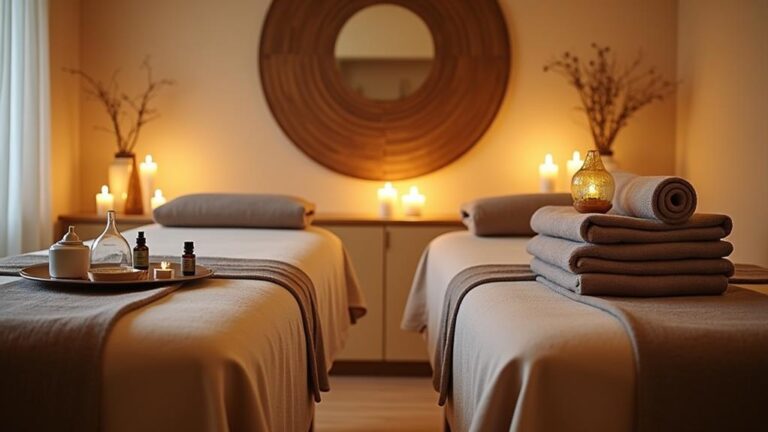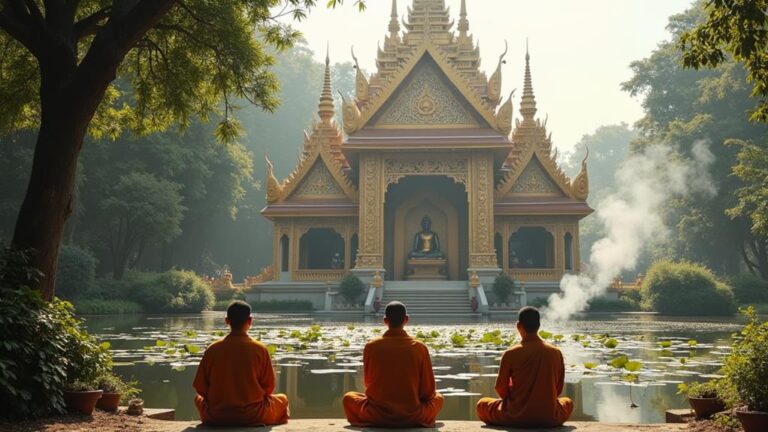Building a house in Thailand typically costs between 25,000 to 40,000 Baht per square meter, but you'll find prices vary widely. Your final cost depends on factors like location, materials, and design complexity. Urban areas often offer more cost-effective options, while remote or coastal locations may increase expenses. You'll need to balance quality and cost when selecting materials, and factor in labor costs for skilled workers. Don't forget the importance of detailed architectural drawings for accurate cost estimation. By considering these factors and implementing smart strategies, you can manage your construction budget effectively. There's much more to explore about building your dream home in Thailand.
Table of Contents
Key Takeaways
- Average construction costs in Thailand range from 25,000 to 40,000 Baht per square meter.
- Costs vary based on quality, with basic builds starting lower and luxury homes costing significantly more.
- Location impacts expenses, with urban areas often being more cost-effective than remote or coastal locations.
- Material quality and labor costs significantly influence the overall price of building a house.
- Architectural design complexity and specific features chosen affect the final construction costs.
Factors Influencing Construction Costs
Complexity reigns supreme when it comes to estimating the cost of building a house in Thailand. You'll find that numerous factors influence the final price tag of your dream home.
First and foremost, the type of project you're undertaking plays a significant role. Are you aiming for a modest bungalow or a luxurious villa? Your architect's drawings and the contractor's level of professionalism will also impact the overall cost.
To get an accurate estimate, you'll need finished architectural drawings, clear specifications, and detailed material lists. These elements are essential for professional construction and help avoid unexpected expenses down the line.
Material costs can fluctuate due to external factors like currency rate changes and minimum wage increases, so it's vital to stay informed about market trends.
Don't underestimate the importance of quality assurance and effective communication throughout the building process. Hiring a professional project manager can help you navigate these complexities and keep your costs in check. They'll make sure that your finished house meets your expectations while managing potential risks and insurance coverage.
Average Building Expenses in Thailand
When planning your Thai home construction, you'll find average costs ranging from 25,000 to 40,000 Baht per square meter.
You'll typically pay 25,000 to 30,000 Baht per square meter for basic quality builds, while luxury homes can exceed 40,000 Baht.
Your final expenses will depend on factors like materials, labor, location, and design complexity, so it's essential to obtain professional architectural drawings for accurate cost estimation.
Typical Per-Square-Meter Costs
Constructing a house in Thailand can suit different budgets, with typical per-square-meter costs covering a broad range. You'll find that construction costs in Thai Baht vary notably based on the quality and complexity of your project.
For basic quality houses, you can anticipate paying between 25,000 to 30,000 Baht per square meter. If you're aiming for a reasonable standard home, your costs may increase to 30,000 to 40,000+ Baht per square meter. Luxury houses can surpass 40,000 Baht per square meter, depending on the finishes and materials you choose.
Your architectural drawings will play a pivotal role in determining the final cost. More intricate designs and high-end features like luxury kitchens will drive up expenses. It's important to take into account that the type of house you're building significantly impacts the overall price.
When planning your budget, factor in additional costs for premium materials and intricate design elements. Remember, the level of quality you desire will directly influence your per-square-meter costs. By carefully assessing your needs and preferences, you can balance your aspirations with your budget constraints in the Thai housing market.
Factors Influencing Price Ranges
The blueprint for your Thai home's cost begins with understanding the main factors that influence price ranges. Your budget will largely depend on the quality level you're aiming for, with basic houses starting at 25,000 Baht per square meter and luxury homes exceeding 40,000 Baht per square meter.
| Quality Level | Cost (Baht/m²) | Features |
|---|---|---|
| Basic | 25,000-30,000 | Standard finishes |
| Reasonable | 30,000-40,000 | Better materials, design |
| Luxury | 40,000+ | High-end finishes, custom |
Site conditions play a vital role in determining costs. Challenging terrain or remote locations can increase expenses significantly. Once your drawings are completed, a professional builder can provide a more accurate estimate based on your specific design and chosen materials.
Material Quality and Pricing

When building your house in Thailand, you'll face important decisions balancing material quality and cost. You can opt for premium materials like hardwood or high-grade concrete for durability, but these will increase your overall expenses.
Consider exploring both local and imported options, comparing prices from different suppliers to find the best value for your construction project.
Quality Vs. Cost Tradeoffs
Balancing quality and cost, homebuilders in Thailand face pivotal decisions when selecting construction materials. As you plan your quality home, you'll need to weigh the tradeoffs between initial construction costs in Thailand and long-term value. Opting for cheaper materials may seem attractive at first, especially in a market with high demand, but it can lead to increased maintenance and repair expenses down the line.
Investing in higher quality materials upfront might strain your budget initially, but it can result in a more durable and aesthetically pleasing home. This approach often pays off in the long run, contributing to your property's overall value and longevity.
When making these decisions, consider how material choices impact structural integrity and visual appeal.
Sourcing Premium Materials
Sourcing top-notch materials for your Thai home construction project demands a keen eye for quality and a savvy approach to pricing. You'll find that premium materials in Thailand can range from 1,000 to 5,000 Baht per square meter, depending on the type and quality you choose. While high-quality materials like imported tiles or hardwood can greatly increase your construction costs, they also guarantee long-term durability and aesthetics for your home.
To balance quality and cost effectively, consider sourcing premium materials locally. This strategy can help you save on import taxes and shipping fees, making your project more cost-efficient. However, don't compromise on quality just to reduce costs. Remember that premium materials are an investment in your home's longevity and appeal.
When selecting materials, evaluate each option carefully. Weigh the benefits of durability and aesthetics against your overall construction budget.
You might find that mixing premium materials in key areas with more affordable options elsewhere can create a luxurious feel without exceeding the budget. By approaching material sourcing strategically, you'll achieve the perfect balance between quality and cost for your Thai home construction project.
Local Vs. Imported Options
In light of your construction project in Thailand, you'll need to carefully weigh the pros and cons of local versus imported materials. Local materials often prove more cost-effective due to lower transportation costs and readily available supply. They're typically well-suited to the Thai climate and building practices, offering a practical solution for budget-conscious builders.
On the flip side, imported materials can provide higher quality and unique design options. While they come at a premium, they may offer superior durability and aesthetic appeal. However, you'll need to factor in potential delays and import taxes when considering these options.
To strike the right balance, consider mixing local and imported materials. This approach allows you to optimize both quality and cost-effectiveness. When making your decisions, assess each material's durability, sustainability, and availability.
Working with a professional builder can be invaluable in handling these choices. They'll help you understand which local materials meet your standards and where imported options might be worth the investment. By leveraging their expertise, you can make informed decisions that align with your budget and quality requirements, ensuring your Thai construction project achieves the perfect blend of cost-efficiency and premium results.
Labor Costs and Skilled Workers
When it comes to building your dream house in Thailand, labor costs and skilled workers play a significant role in your budget. You'll need to take into account the varying labor costs per type of skilled worker required for your project. Carpenters, masons, and electricians are essential for quality construction, and their expertise comes at different price points.
The availability of skilled workers in your chosen location can impact both your construction timeline and overall costs. If you're building in a remote area, you may need to factor in additional expenses for transportation or accommodation of workers.
While it might be tempting to cut corners on labor costs, investing in experienced and reliable skilled workers can save you money in the long run. They'll be more efficient, produce higher-quality work, and are less likely to make costly mistakes. Additionally, their expertise in interpreting construction drawings can prevent misunderstandings and guarantee your vision is accurately realized.
Location's Impact on Expenses

Building on the importance of labor costs, your chosen location in Thailand greatly influences your overall construction expenses. The location's impact on construction costs can be significant, with urban areas often offering more cost-effective options. If you're considering building in a major city like Bangkok or Chiang Mai, you'll likely benefit from better infrastructure and easier access to materials, potentially reducing your expenses.
However, if you're eyeing a remote or coastal location, be prepared for higher costs. These areas may require additional transportation fees for materials, driving up your overall budget. Islands, in particular, can present unique challenges due to limited accessibility and premium land prices.
When selecting your build site, consider its proximity to amenities, utilities, and labor markets. A location with readily available resources and skilled workers can help keep your costs in check. Urban areas typically offer these advantages, while rural or isolated locations may require more planning and expense.
To minimize location-related expenses, carefully evaluate potential sites, factoring in material delivery costs, infrastructure quality, and accessibility. By doing so, you'll be better positioned to manage your construction budget effectively.
Architectural Design Considerations
Moving from location considerations to architectural design, you'll find that detailed plans are necessary for accurately estimating your home's construction costs in Thailand. Architectural drawings serve as the backbone for professional builders to provide precise pricing for your project. These plans outline specifications and materials, which directly impact construction costs and overall quality.
To ensure a successful build within your budget, consider these key aspects of architectural design:
- Detailed floor plans and elevations
- In-depth material specifications
- Structural engineering calculations
- Site-specific adaptations
By investing in professional architectural drawings, you'll gain a clear understanding of your project's scope and potential expenses. This upfront investment helps prevent costly surprises and overruns during construction. Remember, builders rely heavily on these designs to provide accurate quotes, so the more detailed your plans, the more accurate your cost estimation will be.
Don't underestimate the importance of tailoring your design to site conditions and local factors. A well-thought-out architectural plan that accounts for Thailand's unique climate and building practices will contribute to a smoother construction process and a higher-quality end result. Ultimately, thorough architectural considerations are vital for managing costs and achieving your dream home in Thailand.
Cost-Saving Strategies for Homebuilders

Savvy homebuilders know that constructing a house in Thailand doesn't have to break the bank. By implementing smart cost-saving strategies, you can notably reduce building costs in Thailand without compromising on quality or aesthetics.
One effective approach is to utilize reclaimed and refurbished materials. This not only saves money but also adds character to your home. You can source materials from alternative locations, potentially finding better quality items at lower prices.
Don't overlook the potential of refurbishing existing windows and doors, which can provide an attractive old-style look while keeping costs down.
Efficient spending and resource management are key to achieving a beautiful house design on a budget. Consider energy-efficient lighting options like pot lights, which offer long-term savings on electricity bills. These choices not only reduce initial building costs but also contribute to ongoing household savings.



